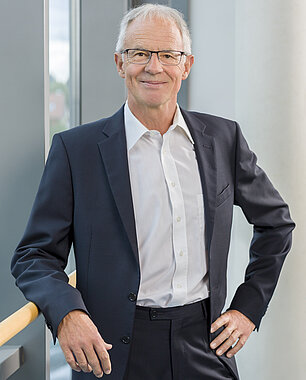 © NXP Semiconductors Austria GmbH & Co KG
© NXP Semiconductors Austria GmbH & Co KG
- Success Story
NXP Gratkorn – Global competence for crucial areas of the future
22. September 2022All signs point to growth. The facility of the Dutch NXP Semiconductors Corporation located in Gratkorn, Styria, makes a significant contribution to the company’s success. Its new research centre currently focuses on crucial areas of the future such as cybersecurity and post quantum cryptography. The management of this global competence centre is based in Gratkorn.
Questions for NXP: Michael Jerne, NXP External Relations
In which areas does NXP operate?
The Automotive segment is extremely important to NXP and generates a large percentage of the company’s revenue. However, NXP is also extremely active in other areas such as “Industrial & IoT” as well as “Mobile” and “Communication Infrastructure.” All in all, our activities can be summarised by the NXP claim “Secure Connections for a Smarter World.”
Which Group activities are a focal point of NXP’s facility in Austria?
The Gratkorn site operates in three of the four above-mentioned segments, with the exception of “Communication Infrastructure.” This is in line with the core priorities of the NXP strategy, namely secure communications, secure digitalisation and also newer activities in the field of smart battery management. In this way, NXP and the Gratkorn facility are making a significant contribution to the “twin transition,” namely the synergetic green and digital transformation.
Why did NXP originally decide for the Austrian business location and why have you repeatedly expanded the subsidiary in Gratkorn?
In our case the course of events was different than usual. In 1987, the startup Mikron was established in the Graz Technology Park. At the beginning of the 1990s, the firm relocated to Gratkorn and was acquired by Philips in 1995. Mikron’s excellence in the field of contactless technologies (RFID) was the main reason for this takeover, and the integration of the startup in the multinational company went very well. Up until today the Gratkorn facility has maintained its reputation of effectively fusing the entrepreneurial thinking and pragmatism of a startup with industrial requirements and processes. This is certainly a key reason why BXP has been constantly relying on the team in Gratkorn and why the facility has continuously grown over the years. The rest of the story is well known. In 2006, the semiconductor segment was spun off from Philips and named NXP. About 650 experts from 45 nations now work at the Gratkorn site.
Investments in research and innovation are the basis for the success of companies such as NXP. To what extent are the underlying conditions of the Austrian business location favourable in this regard?
Research and innovation comprise a key success factor NXP globally and even more for Gratkorn as an R&D site. The locational conditions in Austria are generally good and stable, though we see even more potential in some areas. Its strengths undoubtedly include the well-trained, skilled employees, a good interaction and openness for dialogue between the business and research communities as well as a fundamentally sensible dual funding system featuring direct and indirect research funding. Our cooperation with public authorities also functions very well both with respect to funding issues as well as employees. Stability, security and the high quality of life round off the list of competitive advantages. Issues such as cybersecurity, digital sovereignty and resilience will definitely gain in importance. A potential USP for Austria would arise if we could effectively link our strengths with regard to both the “Green Deal” and the digital transformation. I still see challenges ahead when it comes to Austria’s active positioning as an innovative country and the complex issue of skilled employees. We do in fact have a good educational system, but too few MINT graduates. The political will to change in our area of microelectronics should be accompanied by adequately budgeted and efficient programmes. There is still room for improvement when it comes to the current Austrian budget for key digital technologies (KDT) and IPCEI ME/CT (IPCEI = Important Project of Common European Interest).
As you mentioned, your facility employs a staff of 650 people from 45 nations. How would you rate the quality and motivation of Austrian employees in an international comparison and how important are these factors for the success of your company?
As a matter of principle, NXP attaches immense importance to diversity, naturally also when it comes to the country of origin of our employees. The large number of nations represented at the site is certainly enriching, both from a cultural perspective in the sense of promoting an open mindset, but also with regard to enabling more diverse technical solutions. In any case, the qualifications and motivation of Austrian employees is high and thus strongly competitive. On the one hand, Austrians boast a very good professional education. On the other hand, they also have an effective mix of skills in the interplay of structure and pragmatism. The key success factor is optimally managing this diversity.
NXP announced € 70 million in investments over the next three years to once again expand the Gratkorn site. One priority of the new research centre will be on cybersecurity and post quantum cryptography, two key areas of the future. Can you tell us more about this? What is the significance of this expansion drive for Gratkorn?
The ground-breaking ceremony for the new building to be constructed at a cost of € 12 million took place at the end of June. These new investments will sustainably strengthen the R&D site in Gratkorn within the group. Moreover, we are talking about high-quality R&D jobs and additional research laboratories. Another (and even larger) share of the planned investments will be leveraged via IPCEI ME/CT (IPCEI = Important Projects of Common European Interest), but the approval of the EU is still pending. In any case, cybersecurity in all its facets, whether in the field of post quantum cryptography, secure machine learning or secure process architectures, will remain a key issue for NXP and thus the Gratkorn facility as well. The management of this global competence centre is based in Gratkorn.
Why is the Austrian business location particularly suited for this segment? Does Austria have a unique selling proposition in this regard?
I consider a strong innovative ecosystem, a sustainable cooperation between industry and research and the training of a sufficient number of security experts to be the key successful factors for us. Finding specialists in the field of security is even more difficult than in the MINT fields. If we can make the region even more attractive as a hotspot for cybersecurity, we could create something like a unique selling proposition here.
Were there any particularly formative or noteworthy events, turning points or personal experiences in the corporate history of the Austrian facility which you vividly remember?
After more than 30 years in the semiconductor industry, discussing this topic alone would fill an entire evening. I remember many wonderful experiences such as the legendary summer parties and many leisure activities we shared. From the perspective of the business location, the transformation at Philips and later NXP were genuine milestones, and I have fond memories of events which took place on the occasion of plant extensions and new buildings. Naturally, it is particularly gratifying to recall the market successes which frequently took place after very critical phases. In the early years, contactless systems were still considered to be “black magic” and a technological “alien.” Similarly, “Mifare,” our most popular global chip card technology used for public transport tickets, was teetering on a knife edge several times. The support provided by the Austrian Research Promotion Agency (FFG) within the context of funding projects as well as local support in Styria proved to be crucial in this delicate phase.
Let us take a look at the issue of funding, for example the research premium. To what extent has this influenced decisions made by NXP to invest in the business location of Austria?
As I previously mentioned, I think the dual approach involving direct and indirect research funding is a good thing. This system, combined with other business location advantages I talked about earlier, certainly helped us to secure positive investment decisions over the years for our team in Gratkorn. A particularly good example for this is our attracting the “Secure Machine Learning” competence centre, in which we prevailed over internal competition from Germany and other locations outside of Europe. This competence centre was initiated in the year 2019, and the good support provided by ABA in the beginning was very helpful. In the meantime, two-thirds of the development phase has been completed. From a funding standpoint, these investments (a high double-digit million euro amount) were given a major boost by FFG programmes such as EFRE-Top and Frontrunner, as well as the (first) IPCEI project Microelektronics.
What are the next steps which NXP plans in Austria?
All signs point to growth. NXP Austria also wants to play a leading role in the future within the NXP Group but also as part of the Austrian and European innovation ecosystem. Relevant innovations designed to solve social challenges such as in the fields of electrification (BMS) and cybersecurity are among the top priorities at Gratkorn. We will successfully address these issues together with our research partners, the relevant clusters and platforms and leverage the competence of our employees. In this way, we will make a significant contribution to the twin transition.
Do you have any wishes with respect to the Austrian business location or Austrian Business Agency?
With respect to ABA, I would urge you to continue to act even more strongly as an ambassador for Austria as a country where a high quality of life is fused with extensive innovative strength, as a land of potentials and possible USPs. And please keep an eye on the development and support for companies which are already located here. Moreover, as I mentioned earlier, my wish for the business location would be an even more active and stronger positioning of Austria as a country of innovation. This is already being driven forward for the benefit of our sector, for example via the “Silicon Alps” cluster.
How has ABA supported NXP up until now?
For years we have experienced ABA as a reliable partner which reacts pragmatically and quickly if necessary, and otherwise stays ibn the background, in the positive sense. In any case, the business location project in 2019 involving the Secure Machine Learning competence centre was provided with very efficient and ultimately successful support by ABA. We are very grateful for this.
And finally, one last question: what do you personally value the most about Austria?
The beautiful countryside and the ongoing high quality of life. From a business perspective, I value the short bureaucratic paths and the good networking among the key players in the fields of microelectronics and electronic based systems. And of course, the many friendships which have emerged as a result.
NXP Semiconductors Austria GmbH & Co KG
The Dutch company NXP Semiconductors Corporation employs more than 29,000 people throughout the world and is one of the leading global manufacturers of semiconductors. NXP microchips and software is found in all economic sectors and spheres of life. Every person carrying a mobile phone actually carries NXP chips with him/her. NXP is one of the two leading chip suppliers in the automotive sector.
More Success Stories
